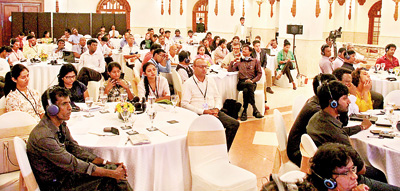News
Right to Information law in Pakistan: Still in its infancy, but effective
The use of Right to Information (RTI) legislation in Pakistan is in its early days, but already, since comprehensive laws were put in place in two of the country’s four provinces, small but revolutionary changes are taking place exposing corruption and compelling authorities to be more transparent and accountable in their dealings.

Mohamed Aftab Alam:Discussing the positive effects of the introduction of R2I in Pakistan
From forcing authorities to disclose details of income tax payers and defaulters, to ensuring that recruitment to government jobs are done on merit and not favouritism, both members of the public as well as media personnel have begun to use RTI laws which have been adopted at a provincial level, as well as the freedom of information laws that are in place at the Federal level.
Mohamed Aftab Alam who works for International Media Support (IMS) as an expert on law, regulations and professional ethics, while in Colombo this week, said that it has taken persistent campaigning by civil society groups as well as some political parties in the country to ensure such legislation was put in place .
“RTI legislation is oxygen for democracy. It helps people form informed opinions, without which the people cannot make proper decisions,” Aftab Alam said.
A landmark case last year, involved a young man who sat for an examination to obtain a government job, only to be told that even though he had obtained the highest marks, he would have to pay to secure the job. “The young man in question did not have money to pay to secure a job, so he decided to forget about it. However, a few months later, he saw that a newspaper advertisement was placed asking for fresh applications for the same vacancy. At this point he decided to send a letter to the Information Commissioner detailing the injustice caused to him. An inquiry was held and the authorities were directed to recruit the young man for the job. A fine was also imposed on the officials who attempted to deprive the suitable candidate for the position,” he said.
This and several other instances which have been largely publicised have also raised awareness among the Pakistani public that RTI laws can be used for their benefit. For example, people use information they obtain, to expose the disparities in placement of teachers for urban and rural schools, how State authorities have failed to fill the necessary cadres in State-run medical institutions, and even expose details of helicopter rides taken by local politicians at State expense.
“RTI legislation makes it mandatory on State institutions to divulge information which they usually keep locked away. Once such information is made public, people are able to see if public funds are managed properly or are being misappropriated or wasted,” he added.

Some of the panellists at the Global Media Ethics Forum : Kamal Siddiqi, Javid Yusuf and Malinda Seneviratne
“Most countries in South Asia including India, Bangladesh and Nepal have enacted RTI legislation, while Afghanistan too is in the process of doing so,” Aftab Alam said. In Sri Lanka, the Government is to introduce RTI legislation within the coming month. Aftab Alam was in Colombo as a panelist at the Global Media Ethics Forum organised by the Sri Lanka Press Institute in partnership with the Global Media Ethics Project was held in Colombo this week under the theme “Media Ethics in the Age of Globalization”.
Among the other panelists were Kamal Siddiqi, Editor of The Express Tribune, Pakistan, Javid Yusuf, Attorney-at-Law and member of the Dispute Resolution Council of the Press Complaints Commission, and Malinda Seneviratne, Editor, the Nation .
Incorporate R2I Law into 19th Amendment, SLPI tells Govt.
The Sri Lanka Press Institute (SLPI) this week called for the proposed Right to Information Law to be incorporated into the 19th Amendment to the Constitution, currently being drafted by the new Administration.
The SLPI, which represents the country’s newspaper publishers, editors, working journalists, media workers’ trade unions and media freedom activists has already urged senior government leaders that the Right to Information Commission that will be established under the proposed Law, be given Constitutional status similar to the Independent Police Commission, Public Service Commission, Elections Commission and the Bribery or Corruption Commission, once they get re-activated under the 19th Amendment, a press release from the Institute said.

A section of the audience at the Global Media Ethics Forum. Pix by Indika Handuwala
The country is witnessing the exposure of colossal amounts of wastage, mismanagement and corruption alleged to have taken place during the previous Administration. Much of this could have been averted earlier had a Right to Information Law existed. Despite repeated requests to enact such a law in the public interest, the earlier Administration refrained from doing so. It is now reaping the whirlwind of allegations made against its key personnel.
The SLPI requests this Government to provide the proposed Right to Information Commission Constitutional guarantees to ensure its viability in providing the country with good governance measures. Moreover, free communication of government information and opinion about public and political issues is essential and implies a free Press. The SLPI calls on the Government and all constituent parties, including those in the Opposition, to give due consideration to this key proposal, in its application of good governance and democracy.

